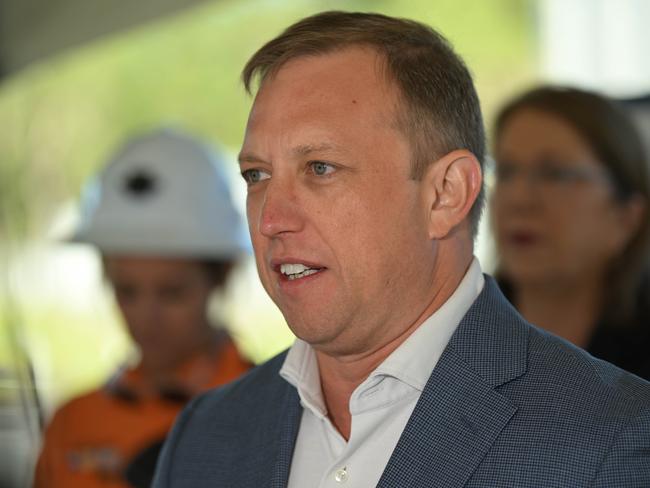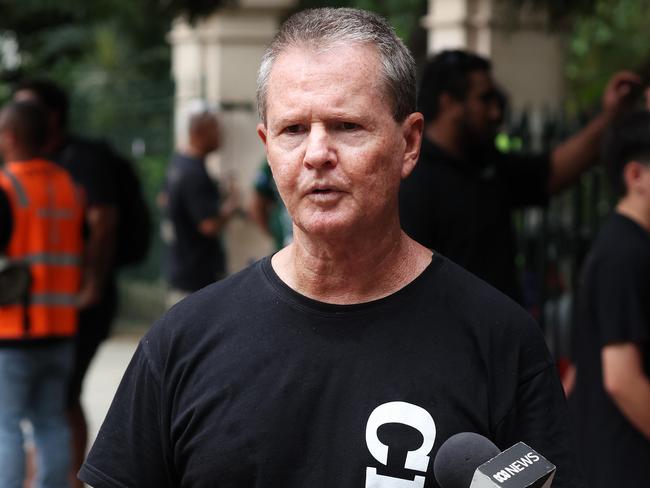$200k+ wages, 50pc raises: Luxe life of workers on state’s major projects
Construction workers on state projects could pull wage rises of more than 50 per cent, while teachers, nurses, police and correctional officers languish with single-digit increases.
QLD Politics
Don't miss out on the headlines from QLD Politics. Followed categories will be added to My News.
Construction workers on government projects could pull wage rises of more than 50 per cent under the controversial Best Practice Industry Conditions policy – while the state’s teachers, nurses, police and correctional officers languish with single-digit increases.
Industry modelling obtained by The Courier-Mail paints a picture of the impact BPICs would likely have on tradie wages on government projects compared with the industry standard rate, as insiders raised the alarm on the state’s interference in the sector.
But Premier Steven Miles on Wednesday told Queensland’s frontline workers they were doing better than those in other states, saying “they’ll acknowledge that we have some of the best wages and conditions for all of our frontline staff”.
The modelling, which has been presented to the government, shows traffic controllers who are required to undertake a two-day training course would be paid more than 48 per cent above the standard industry rate on a $100m BPIC project, and as much as 146 per cent more on a $1bn plus project – about $200,000 a year.
Civil labourers would get about $140,000 on a $100m project and about $215,000 on a $1bn project – such as the planned pipeline of renewable projects — which equates to about 88 per cent higher than the industry standard.
But in comparison, Queensland schoolteachers with six years’ experience were currently paid about $110,000 per year – and will receive a 4 per cent increase in July.
An experienced senior constable would be paid about $125,000 with penalties, while a registered nurse is likely to take home about the same – with both sectors in line for a single-digit percentage annual pay rises this year.
Mr Miles vigorously defended the extraordinary BPIC deals inked with the unions for major Queensland projects, saying – on at seven occasions – the conditions “represent the prevailing EBA rates in the industry”.
“These are real people too and people with families and people who deserve a decent wage deserve to be able to provide for their families, deserve to be able to come home safe from work,” Mr Miles said.
“I know there are people out there criticising the wages and conditions of working people, but I won’t be one of them, because I know that there are two sides to cost of living – there’s what it costs to buy things and then what you earn for going to work.”
Asked how he thought frontline workers might feel learning of the perks offered to those in the construction industry, the Premier said: “if they look at their conditions compared with the conditions of similar workers in every other state and territory, they’ll acknowledge that we have some of the best wages and conditions for all of our frontline staff”.
“Our nurses, our teachers, our ambos – they have among the best conditions in the country,” he said.

“That’s not something that we’re ashamed of, it’s something we’re very proud of.”
Health Minister Shannon Fentiman also backed the Premier’s comments, saying “as the Queensland Government we should be a model employer”.
“If you talk to paramedics in Victoria or New South Wales, they’re all asking their government ‘why can’t I get paid like Queensland pays them’.
“We should be leading the way as the public sector for the rest of Queensland business and industry to follow.”
Prime Minister Anthony Albanese says the federal government supports infrastructure in Queensland and good wages and conditions, but noted those needed to be “appropriately negotiated out”.
Mr Albanese, in an interview on 4BC, skirted around declaring his support for the state government’s controversial “Best Practice Industry Conditions” — dubbed the CFMEU tax for increasing costs of construction by up to 30 per cent — when asked.
“We support infrastructure here in Queensland. And we also support good wages and conditions. We think they should be appropriately negotiated out,” he said.
“We think people should be appropriately paid for jobs that they do and that there should be, as well, important health and other conditions attached to work.”
National’s Leader David Littleproud also weighed in on the debate and said with the government’s BPIC conditions driving up costs “someone’s going to pay for it”.
“And that’s going to be you, whether it be with you directly, (when you) buy or build or construct a dwelling, or whether it’s for the actual public infrastructure that’s being built by the Australian taxpayer,” he said.
“Now I’m not against fair and reasonable work conditions, but we have to be realistic about what we can afford and under what conditions.”
“I think we’ve got to be realistic and I think unfortunately this government is just empowering unions to get high up in the stirrups, but that cost has to be passed on.
“So whether you’re a taxpayer or you’re directly building, you are going to pay and you’re going to pay a lot more because of the ideology of this government.”

But the boss of the CFMEU said he made no apologies for the extraordinary conditions, which he claimed were “backing Queensland construction and manufacturing workers’.
CFMEU state secretary Michael Ravbar also hit out at the Masters Builders Association – who have spoken out against the policy this week – saying it was “outrageous for the (MBA) Association to complain about regional workers having an opportunity to earn better pay and conditions on government construction projects.”
“Their race to the bottom only ever leads to less safety, lower wages, more exploited visa workers and cheap imported building products on the job,” he said.
“As this state’s largest blue-collar union, we make no apologies for backing Queensland construction and manufacturing workers.”
The CFMEU also claimed BPIC projects were better regulated and delivered “bang for buck” for taxpayers.
“Blue-collar unions are on a unity ticket in support of the state government’s Best Practice Industry Conditions policy because it puts Queensland first by backing local workers and manufacturers,” a statement read.
“Where it is implemented properly, the BPIC policy has resulted in greater investment in local suppliers and better conditions for local workers – including apprentices, women and First Nations workers.”




